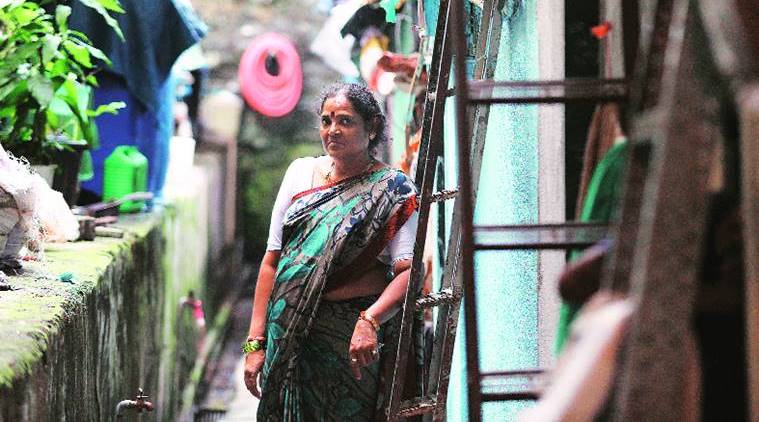Baby’s Days Out: The rise, fall and possible resurrection of a Mumbai drug queen
Shashikala Patankar had been one of the first to sniff out a viable business in mephedrone, a synthetic white powder indistinguishable from cocaine, but cheaper.

Catch me if you can: Shashikala Patankar at her home in Siddharth Nagar, Worli. (Source: Prashant Nadkar)
The last time we met, across the road from the Bombay City Civil and Sessions Court in Kala Ghoda, Shashikala Patankar told me she was selling fish. Over WhatsApp.
That a woman billed as one of Mumbai’s “drug queens” in 2015 would be showing me pictures of pomfret two years later was definitely surprising. But Baby Patankar did look more worried than usual. She had the skittish expression of a person being watched. She held on to her purse and wiped away the sweat on her face with the pallu of her sari.
Patankar had been one of the first to sniff out a viable business in mephedrone, a synthetic white powder indistinguishable from cocaine, but cheaper — all the better to draw students, pensioners, working professionals.
The youngest of six siblings, Patankar grew up in Worli’s Siddharth Nagar slum, loathing policemen. At the age of 10, she had told me, her brother Bharat was picked up by the police as an accused in a murder committed by another brother, Shekhar. “Bharat was depressed after being assaulted in police custody and set himself on fire soon after,” she said.
As a young mother of two children, Patankar washed utensils and sold milk for a living till she came in contact with a brown sugar dealer in 1985, say retired narcotics officials. She started out as a peddler and soon had a gang of young men in her employ. They hustled on the streets, while she comfortably sorted through the contraband from her hutment on top of the hill. In this, say cops, she was typical of other Mumbai women at the helm of the trade, like Kamli, who peddled brown sugar in Ballard Estate in the 1990s; or Papamani Iyengar, whose turf was the slums of Mumbai’s eastern suburbs.
But Patankar was more than a drug lord. She was a slumlord in the making — anticipating the influx of migrants from other states, she had built tenements for rent on the sparsely populated Worli hill where she lived. With power and pelf, followed the attention of the police. But she was one step ahead, allegedly paying off local policemen on her books or serving light prison sentences. In her early days, goes the story, she used older son Girish as a drug mule, fitting him with a white shirt with packets of brown sugar stitched on it. Ahead of a police raid, Girish ran for his life. In the end, there would be no seizure to make.
How and why she found herself in a relationship with a Mumbai police constable, therefore, is a question unanswered. But Dharmaraj Kalokhe and she soon fell out. Some say her anger at him was so great that Patankar was willing to risk all she had.
In March 2015, Kalokhe was arrested in Maharashtra’s Satara district in possession of 112 kg of mephedrone. Rumours began to float that Patankar, who later became a co-accused, had tipped off the police to get back at Kalokhe for his constant physical abuse and his attempt to corner her profits.
These are rumours that she has never confirmed, but also not gone out her way to deny. That wasn’t the first time she got a reputation of a cop-baiter. In 2011, she was the informer who led the Mumbai Police’s Anti-Narcotics Cell to catch an inspector with a stash of brown sugar. Late in 2015, she secretly approached the Maharashtra Anti-Corruption Bureau after Deepak Humbre, a deputy superintendent of police in Satara investigating her case, allegedly demanded a bribe to go easy on her. Both men found themselves out of a job.
Until the Kalokhe fiasco, she had managed to give the police the slip at Siddharth Nagar, using her knowledge of the lanes she had grown up in to go undetected. By the time they would reach her house, they either found it shut, or were confronted by her daughter-in-law Sarika, who threatened to complain of molestation if they took her away.
But even those pale into comparison with what the police count as her great escape from a tight spot. In March 2001, Patankar had been arrested with 30 gm of brown sugar. By November, she was out, acquitted by a special Narcotic Drugs and Psychotropic Substances (NDPS) Act court at the Bombay City Civil and Sessions Court. The police continues to be stupefied by that fact that Patankar managed a release a from jail in less than eight months. Trials in most NDPS cases do not even begin for at least a year.
Will the recent charges against her stick? In the last few months, the investigation and quality of evidence produced in court has embarrassed the state police. After Patankar was discharged by a court in Satara in 2017, many officials feel that it is only a matter of time before the Mumbai police’s case also collapses.
So, even if she is not her fiery self, Patankar is not down and out. She has also convinced herself that she is now a crusader against drugs. “Drugs are being openly sold outside Worli Dairy,” she had told me indignantly the last time she called. “But the police aren’t doing anything. Tum mein dum hai toh kuch karo! (Do you have it in you to do something?)” she said. Who would have thought?
For all the latest Eye News, download Indian Express App






















No hay comentarios:
Publicar un comentario